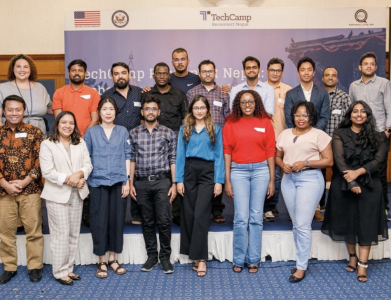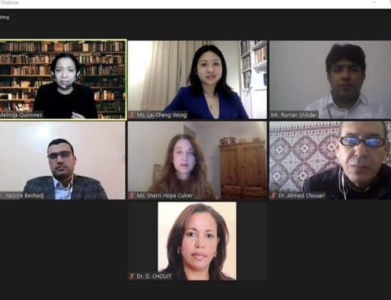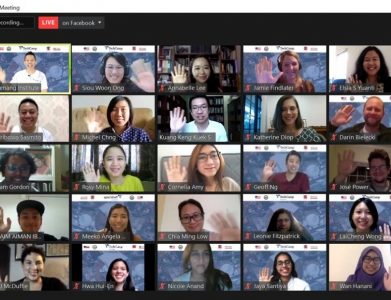Although the COVID-19 pandemic has brought many in-person events to a halt, TechCamp organizers haven’t stopped thinking of ways to bring programming to community leaders around the globe.
TechCamp Malaysia, held in five sessions between October 6-16, 2020, was the first TechCamp hosted in a fully online setting. The event’s focus was combatting disinformation, an issue that’s become central to the post-pandemic world.
Our writer spoke with three different people to learn about what it’s like to be involved in a unique and impactful virtual event like TechCamp Malaysia. Continue reading to see what they had to say.
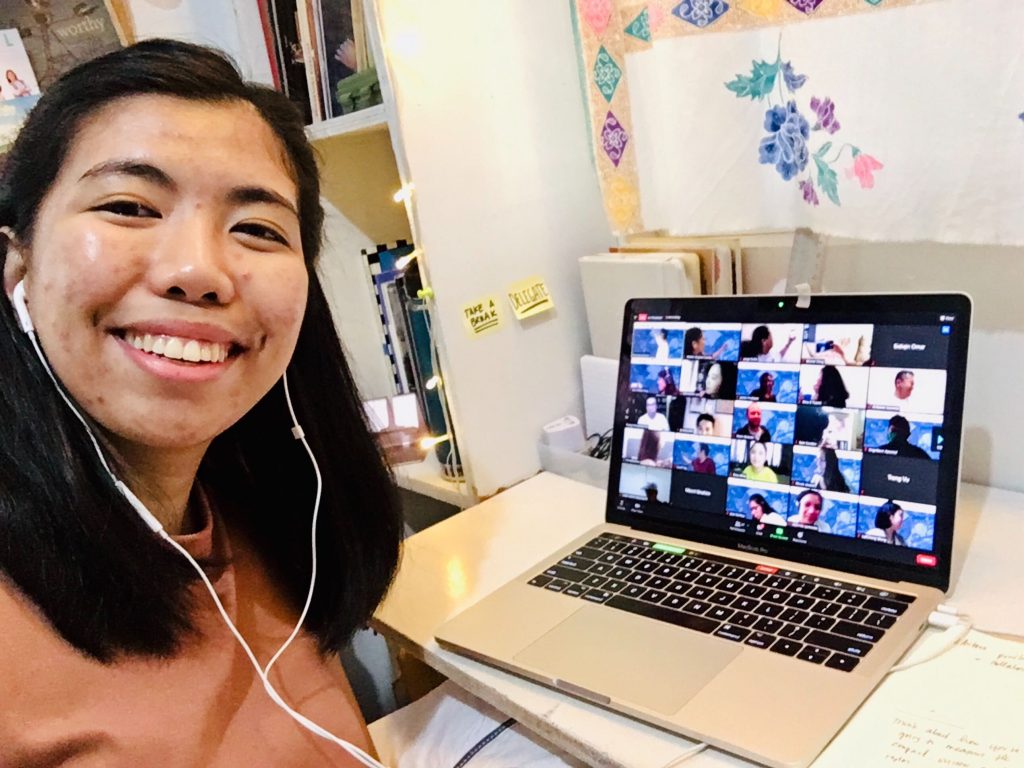
Meeko Angela Camba, Philippines: fact checker at VERA Files; TechCamp Participant
Camba is a fact checker and reporter at VERA Files, an independent, nonprofit online media organization known for producing in-depth and investigative reports. She leads a team monitoring and debunking false and misleading statements from social media as well as public figures.
What did you enjoy about the TechCamp experience?
I’ve been in a lot of trainings before, but this is the first time that the topics selected were geared towards developing solutions. They gave us time to brainstorm and talk amongst ourselves, trying to come up with a doable and actionable plan that we can try and implement in our own organizations. One of my favorite sessions was Media Literacy that Mimi [van Dun] conducted. She shared things that we can directly apply in training sessions we do at VeraFiles.
Also, as we’re all working remotely, it was nice still having the chance to meet colleagues from different parts of the region. We’re all facing the disinformation problem in different fronts. Having a different perspective from what I’m used to was something that made the TechCamp experience unique.
How did you balance attending TechCamp with work and your daily life?
I’m still living with my family because of quarantine. Mainly, we’re balancing who maintains the household, who cooks lunch, who feeds the pets, and things like that. Outside of house chores, work keeps us very busy.
The Slack app was an important tool in maintaining a connection between participants, trainers, and organizers during this remote event. How did you utilize this online space?
I appreciated the space because it allowed us to maintain contact. Our group made a separate thread for when we were developing our project. During the TechCamp, I was using Slack quite a lot — I was often stalking through other participants’ responses. It’s good that it was there, especially to make up for all of the social aspects that we’d have for an in-person event. With the Slack [channel] you have access to everyone.
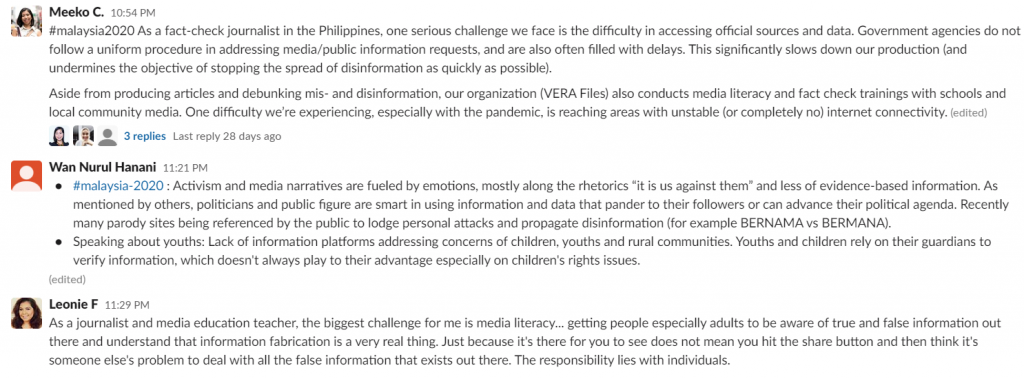
What are some of the largest topics you see spreading in disinformation at the moment?
Here in the Philippines, the narrative from the government is to show the public that they acted promptly when they were addressing the COVID-19 health crisis, when that’s not really the case. For online disinformation, we’ve seen a lot of fake cures and treatments. We’ve had some weird ones— we had some absurd claims about a newborn baby suddenly being able to talk and advising people to eat hard-boiled eggs to prevent COVID-19. It’s getting very creative.
What are some of the lasting impacts of disinformation?
When people are confused, they tend to get scared and don’t know who to trust, and it’s difficult for democracy to function. You don’t know if you want to participate, and if you do, you’re not sure if your information is based on sound, rational, or based on hard evidence.
A key challenge as fact checkers is how to make sure or try to make sure that people are well-informed and confident. We want to make sure they know basic research and verification skills so they won’t become harmed by disinformation. We have limited time and resources, but we’re doing our best to show people that they need to be critical of the information they receive.
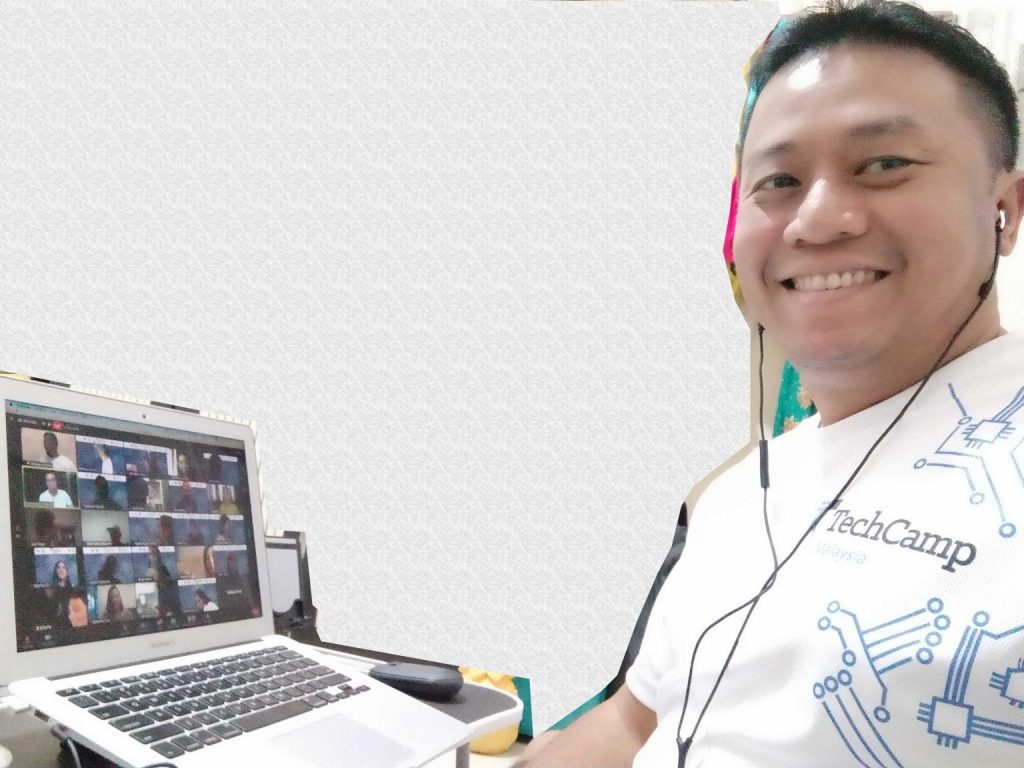
Aribowo Sasimoto, Indonesia: founder of MAFINDO; TechCamp Trainer
Sasmito is one of the original founders of MAFINDO, a non-profit organization combating false information (or hoax as they are commonly called in Indonesia). He leads fact-checking teams and manages MAFINDO’s various media channels, including a database of fact-checked articles, turnbackhoax.id.
What was your overall experience participating in an all-online capacity building event? Were there aspects of it that you found enjoyable or surprising?
I think everyone is having difficulties trying to adjust to our new forced behavior. Previously, my mindset would have been that if you can attend physically, then the online format is not necessary. You can get a better feel by being there physically. Now that it’s been a few months, the virtual training format is standard, so it felt quite normal.
What did you find most valuable about the programming?
The collaboration and getting to know other trainers, most of whom are journalists. Exchanging contacts and social media accounts, and being able to share issues with other people about infodemic. For example, last week I was interviewed by a journalist from Malaysia who had attended the TechCamp.
As a first time TechCamp trainer, would you like to return for another similar event? What would be your main takeaways?
I was kind of nervous at first. I thought, “how am I supposed to do this? Is it enough to do just the one presentation?” Luckily, Siou Woon from the Penang Institute was very helpful and gave me the advice I needed. The first time doing something always makes me nervous, but I really enjoyed the event and reminding people that disinformation is a problem for everyone.
Do you see yourself as a continuing resource for participants even after the event’s conclusion?
Of course. My Slack and WhatsApp are available 24/7. I told the participants to please stay in touch, and some of them are already asking questions and connecting with me on social media.
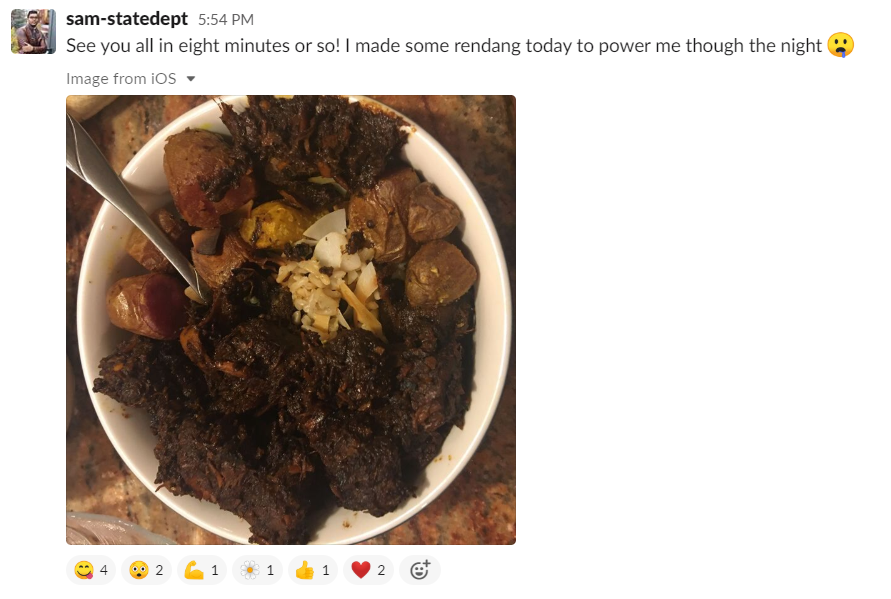
Sam Gordon, Senior Program Officer (TechCamps)
Why did you decide to go forward with an online TechCamp? What changes had to be made to make it happen?
We were really excited when this proposal came in from our colleagues in Malaysia. It’s an important audience. We’re still optimistic that we’ll be able to plan an in-person convening at a later date once it’s safe, but we didn’t want to abandon the program.
While there are limitations, there are some advantages too. It allows us to serialize the program a little more. The cool thing about in-person TechCamps is that there’s a bunch of excitement. It’s great to meet face-to-face with individuals — but it’s a very brief and beautiful moment in time. With a serialized program, we can stagger the content and it can fit into the schedules of our busy participants, many of whom are still covering stories, going to the newsroom, and taking care of families.
What are some of the challenges of holding an online-only TechCamp?
Internet connectivity can be spotty in some places in Southeast Asia, especially with us doing outreach to people not in capital cities with strong infrastructure. However, with the virtual TechCamp, costs are lower because we’re not flying people in or paying for hotels. We were able to roll over our savings into internet subsidies so participants could be connected when it mattered most.
Were there any unexpected benefits to doing a TechCamp online, such as access to more trainers or accepting more participants?
We were able to record all the training sessions. Typically, participants find it overwhelming that they have to select two to three training sessions out of up to ten. Trainers are often wishing they could attend some other trainers’ sessions as well — they’re all curious professionals and eager to keep improving their craft. We can record those sessions and make them on-demand. Participants that are curious and want to learn everything can do so at their own pace.
What’s in store next? Are there any more online TechCamps planned for the upcoming months?
We plan to hold a series of online training sessions with our Embassy team in Bogota, Colombia centered around the Venezuelan migration crisis across South America. We want to promote balanced reporting and establish long-lasting professional networking between regional journalists and content creators.
We are also going to plan another full virtual TechCamp in January for our colleagues in Central America and El Salvador. The main theme is countering violence through economic opportunity, and we will be looking in particular at the surf and tourism industry in El Salvador. El Salvador is one of the best places to go surfing, but there’s been a lag in tourism infrastructure. Through this novel approach of economic empowerment there’s potential for change.
*** Interviews have been edited slightly for brevity and clarity.
